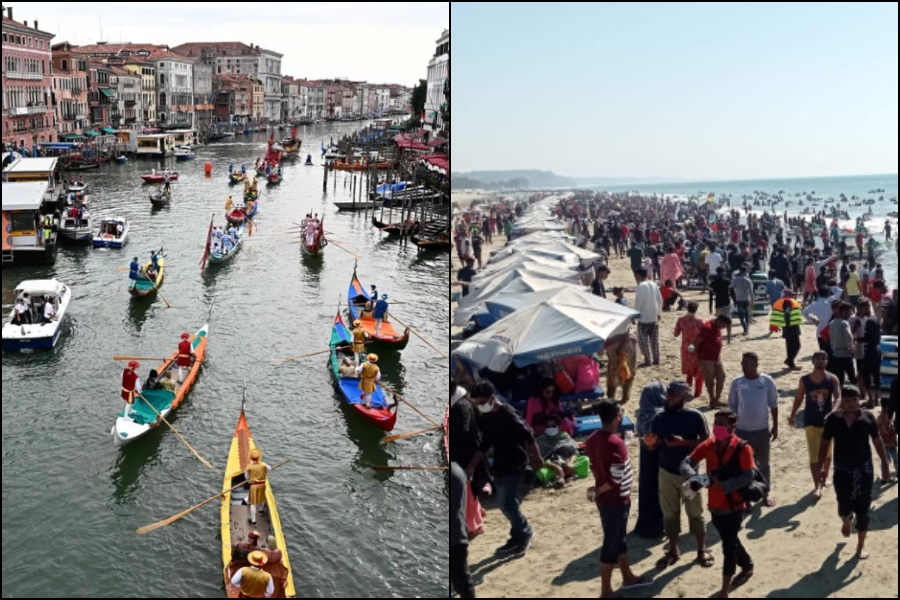Should Bangladesh start controlling over-tourism like Venice?

Published :
Updated :

Recently, the news highlighted that Venice, Italy, will be the first city in the world where tourists going on day tours will have to pay to enter. From spring 2024, tourists returning to this city, known as the 'floating city', will have to pay 5 euros.
In an effort to combat over-tourism in the well-known Italian city of Venice, tickets for day trippers planning to visit the city in the upcoming months went on sale on Tuesday. However, this rule will not apply every day; it will only work on certain days when people are more crowded.
Some exemptions include those for commuters, residents' close relatives, and children under the age of 14. Residents and those born in the municipality are exempt and must present their identity cards.
The program, approved last year, does not yet have an entry cap. For years, officials debated the most effective way to control the millions of tourists that flock to the well-known city, attracted by attractions like St. Mark's Square, the Rialto Bridge, and its endless gorgeous canals. Venice's tourism-related issues have prompted UNESCO to submit a proposal to put the city on the list of 'World Heritage in Peril.'
In Bangladesh, this ticket system can help control the pollution caused by overcrowding in various tourist centres or public places.
According to Bangladesh Tourism Police, there are over 800 small and big tourist places in Bangladesh. If these places can be linked with tourism through proper planning, it will play a major role in the economic development of this country.
However, the environment and biodiversity of the country's main tourist areas are severely damaged today. The Department of Environment has currently declared a total of 13 places as environmentally sensitive areas. Day by day, these tourist areas are becoming more and more endangered, which is considered an obstacle to developing a sustainable tourism system in these areas.
Among the eight South Asian countries, Bangladesh is ranked fourth in the Mundi ranking. Tourism is at the top as one of the main priority sectors in almost all countries.
In 1950, the number of tourists worldwide was only 25 million, which in 2022 stood at 1200 million. According to the Bangladesh Bureau of Statistics, the tourism sector's contribution to the country's GDP is 3.02 per cent.
Economists believe that the tourism industry can achieve 10 per cent of GDP. Besides, many private tourism organisations have been developed around Bangladesh's tourism industry. About one million people in Bangladesh are directly and indirectly involved in the tourism industry.
Tourism plays a major role in the economic development of various countries and in improving people's standard of living. However, the responsibility page of the Bangladesh Tourism Balance Sheet shows that the industry is providing logistics for several harmful and destructive activities.
The tourism industry consumes more water than other industries. Tourism can put pressure on local people's food, energy, and other raw materials. In fact, it is not tourism that needs to be regulated, but the behaviour and customs of tourists. This requires various types of strict regulatory laws.
According to the information of the Department of Environment, the environment and biodiversity of the main tourist areas of the country, including St. Martin, Cox's Bazar-Teknaf, Sonadia Island, and Sundarbans, have been seriously damaged due to the creation of inefficient and unplanned infrastructure and uncontrolled activities.
Currently, 13 places have been declared as environmentally sensitive areas by the Department of Environment. These tourist areas are becoming increasingly endangered daily, and stakeholders think they are standing in the way of creating a sustainable tourism system in these areas.
Kuakata Beach, Cox's Bazar Beach, Sylhet's Jaflong, Bholaganj, other country river and bank areas, and even university areas are crowded during the holidays. Plastic pollution, water pollution, soil pollution, etc., are becoming very evident in these areas because it is difficult to control such a large number of people.
Therefore, if a price is set for entry to the area, it will reduce the amount of human migration and save some money for protecting the area's environment.
But this system also has a downside. In our country, people's interest in tourism is gradually increasing; along with the rich people, people with relatively less income also go sightseeing or enjoy places for mental refreshment on holidays.
A ticketing system will increase the costs of tourists or visitors, which may discourage many people from doing so, reducing interest. Also, there is always a risk of syndicate and corruption by dishonest authorities regarding ticketing.
purbasha-2017413525@devs.du.ac.bd


 For all latest news, follow The Financial Express Google News channel.
For all latest news, follow The Financial Express Google News channel.